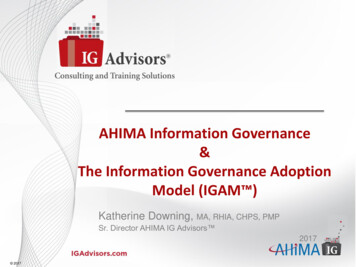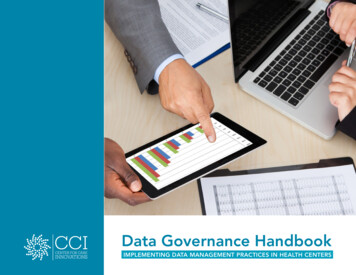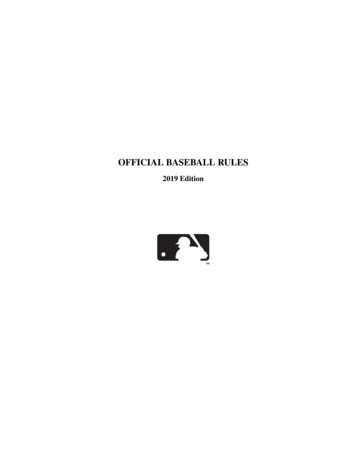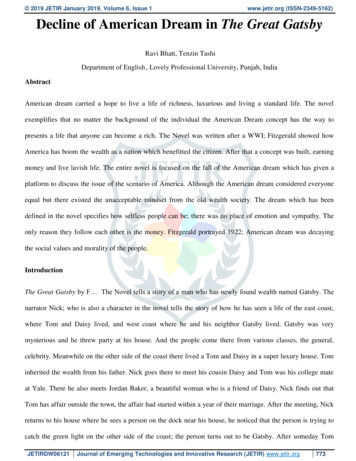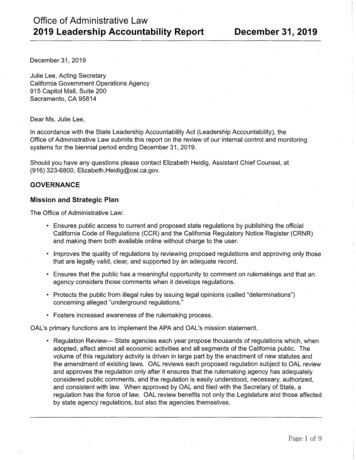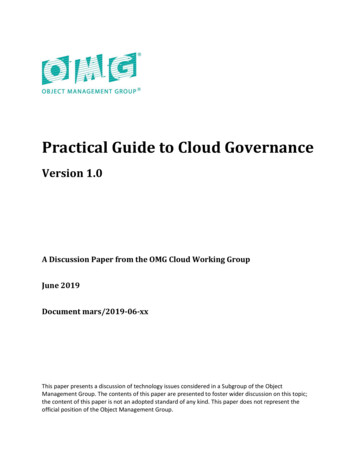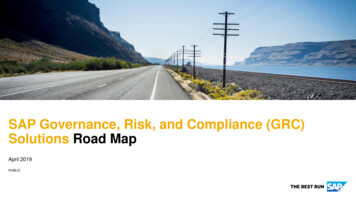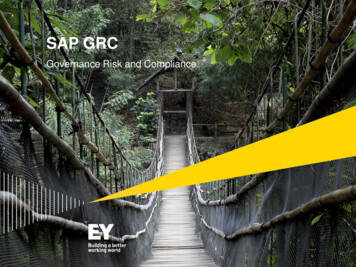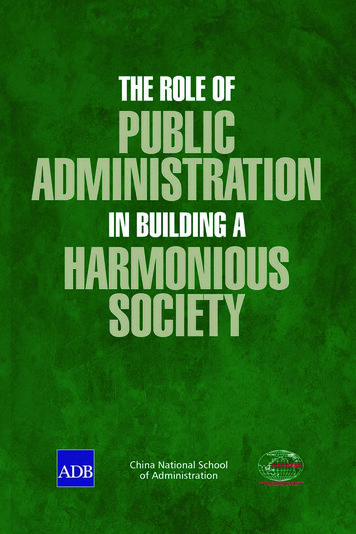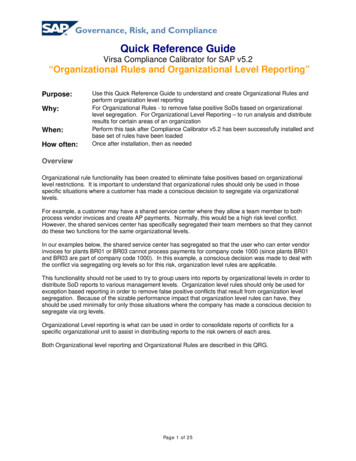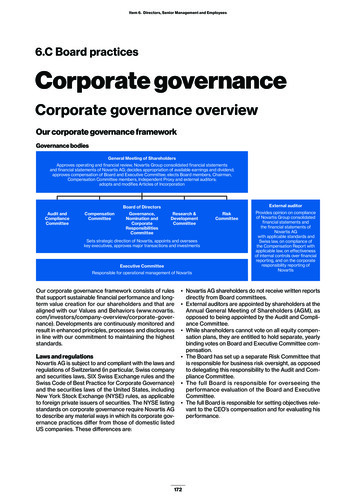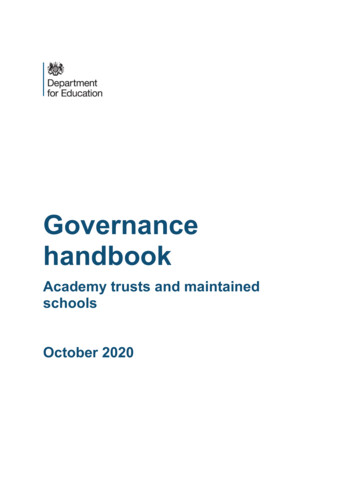
Transcription
GovernancehandbookAcademy trusts and maintainedschoolsOctober 2020
ContentsForeword4About the Governance handbook6AimReview dateCoronavirus (COVID-19) outbreak and the Governance handbookTerminologyWho is this publication for?What has changed in this edition?1. Effective Governance666788131.2 The key features of effective governance2. Strategic leadership13182.1 Setting direction2.2 Culture, values and ethos2.3 Decision making2.4 Parental and community engagement3. Accountability18181921233.1 Boards’ relationship with executive leaders3.2 Robust oversight of a school or academy trust3.3 Accountability for educational performance3.4 Rigorous analysis of data3.5 Accountability for financial performance3.6 Sources of financial data and tools4. People232425273233364.1 Building an effective team4.2 Training and development4.3 The chair4.4 The clerk (governance professional)4.5 Liability4.6 Time-off work4.7 Payments to governors and academy trustees4.8 Publishing information about individuals5. Structures3643444647474851535.1. Governing a group of schools5.2 The governance structure of academies5.3 The governance structure of maintained schools5.4 Collaboration5.5 Publishing information about governance structures25355636770
6. Compliance726.1 Governance procedures6.2 Charity and company law duties6.3 Health & Safety6.4 Equality6.5 Education6.6 Staffing and performance management6.7 Finance6.8 Safeguarding and pupil welfare6.9 Pupil well-being6.10 Admissions6.11 School premises6.12 Control and community use of school premises6.13 Conversion to academy status6.14 School organisational changes6.15 Information sharing6.16 Complaints6.17 Whistleblowing7. 481491517.1 Developing the board's effectiveness7.2 External reviews of governance7.3 Inspections7.4 Schools causing concern7.5 Support to be effective3151152153155157
ForewordGovernance has never been more critical to the education of our nation’s youngpeople. As Minister for the School System I see at first hand the impact of governorsand governance professionals. The governance duty is, above all, to drive relentlessambition for the young people served by our schools system, whatever thecircumstances.The coronavirus outbreak brought out the best in the leaders and teaching staff ofschools and academy trusts. The response to the pandemic has been exceptional inensuring that, as far as possible, all children have continued to have access toeducation, whether at home or, for the vast majority, now back in the classroom.I have been impressed to see the governance sector adapt so quickly to virtualmeetings, while continuing to discharge your core functions. Despite the challenges,you have continued to play a vital role in supporting school leaders to ensure that theneeds of all learners, including vulnerable children and young people, have beenmet. We have seen that schools and academy trusts who formed strong partnershipswith other schools and trusts have been most resilient through the pandemic. So,thank you. I recognise it has neither been easy nor straightforward.We have taken the decision not to include every COVID-19 guidance update in theGovernance Handbook 2020, given that the department has a dedicated area ongov.uk and because many of those changes are temporary. However, some criticalchanges are included, for example information on the resumption of Ofstedinspections from January 2021. The Handbook focuses on key governance andeducational policy updates to support you for the year ahead. We will also continueto update you on the latest announcements via the Governance Update, which nowreaches more than 70,000 of you directly.Alongside the Handbook we are also publishing new governance role descriptors.These are in response to the sector asking for clear information relating to roles inschool and trust governance, and how these different layers of governance interact. Iencourage you to use these documents when inducting new volunteers and thosenew to clerking, or as refresher material for more experienced governors, trusteesand Members.This academic year, the department’s vision of robust and effective governance inevery school and trust, and tackling areas of governance weakness, continues to bemy priority.There is significant work to be done to get all pupils back on track, which means yourrole in monitoring how core school budgets, catch-up funding and Pupil Premium are4
being spent has never been more vital. In academy trusts, keeping Membersinformed of trust business, including its financial circumstances, is also important sothey can be assured the board is governing effectively. The updated Memberssections in the Handbook, and the new role descriptors, give clarity to full extent ofMembers’ roles in the accountability of trustees.I recognise that all this can only happen when we have people with the necessaryskills and knowledge on each governing board and where those boards areaccessing support and independent advice from a professional and effective clerk.More than ever we also need diverse boards, and the Handbook has been updatedto emphasise the expectation that recruitment processes should encouragevolunteers from a wide range of backgrounds, cultures and perspectives, that betterreflect the communities they serve.Finally, as you prepare for your board and committee meetings for the coming year, Iencourage you to continue to work collaboratively and share best practice with otherschools and trusts. The leadership and check-and-balance you provide is essentialin monitoring and reviewing risks and plans, as well as in supporting your schoolleaders to implement plans that support staff and pupils, and ensure that all childrenreceive the education they deserve whatever the circumstance.I thank you for your continued dedication to upholding the integrity of our system.Baroness Elizabeth BerridgeParliamentary Under Secretary of State for Schools5
About the Governance handbookAimThe Governance handbook is guidance from the Department for Education (‘thedepartment’). It sets out the government’s vision and priorities for effective schooland trust governance by: outlining the core role and functions of the governing board; summarising and providing a first point of reference on all the legal duties onboards, 1 signposting to more detailed information, guidance and resources;and providing information on the support available to boards to be effective.It should be read alongside the department’s ‘Competency Framework forGovernance’ and the ‘Clerking Competency Framework’, which describe theknowledge, skills and behaviours needed for effective governance and professionalclerking. This guidance is also aligned to the Academies Financial Handbook (AFH),which academy trusts must comply with as a condition of their funding agreement.There may be specific additional governance expectations or arrangements put inplace for specific groups of schools for example by diocesan authorities, academysponsors or multi-academy trusts (MATs). This handbook does not aim tosummarise these.Review dateThe Governance handbook is kept under review and updated to reflect changes tothe law affecting governing boards and changes to education policy – usually on anannual basis.Coronavirus (COVID-19) outbreak and the GovernancehandbookCareful consideration has been given to how this version of the Governancehandbook should reflect the current coronavirus (COVID-19) outbreak and its impacton school and academy trust governance guidance. Given that the situationcontinues to evolve, boards should consult specific coronavirus-related guidancepublished on the dedicated section of GOV.UK. The department will also endeavourto keep governors and academy trustees informed of any new coronavirus guidanceFor academy trusts, these are given with reference to the latest model articles of association andfunding agreement. Individual trusts should refer to their own documentation.16
or announcement via the School Governance Update gov.uk page. The Governancehandbook is guidance to reflect the government’s requirements for effective schooland trust governance, therefore temporary changes to policies or legislation have notbeen reflected. However, in the ‘what has changed in this edition?’ section, links areincluded to the GOV.UK pages which have the relevant guidance and legislativechanges in relation to coronavirus.TerminologyThroughout the handbook, references to: the board should be taken to mean the accountable body for the school orgroup of schools: in local authority (LA) maintained schools, this will be thegoverning body and in an academy trust this will be the trust board.(Committees to whom the board has delegated functions should take accountof guidance to the board, in so far as the relevant function has been delegatedto them); the organisation means the school or group of schools being governed; executive leaders should be taken to mean those held to account by theboard for the performance of the organisation. This may be the CEO,executive headteacher, headteacher or principal, as well as other senioremployees/staff, depending on the structure of the organisation; academy trusts or trusts should be taken to include free schools, universitytechnical colleges (UTCs), studio schools and trusts with multiple academies(MATs); Trusts with multiple academies (MATs), usually known as multi-academytrusts, a single legal entity, a charitable company with a trust board that isaccountable for all of the academies within the trust. Academy trustees means those that sit on the board of an academy trust(who in some academy trusts, most commonly academies with a religiouscharacter, are referred to as directors or company directors); Members refers to the current Members of an academy trust company; boththose who are the founder Members and those who subsequently becameMembers; local governing body (LGB) means a committee of a MAT board that isestablished as such under the trust’s articles of association; may also beknown as academy committees at local level; maintained school governors or governors means those that sit on thegoverning body of a maintained school – references to specific categories of7
maintained school governor, as defined in regulations, 2 are all capitalised e.g.Foundation Governor, or Parent Governor.Who is this publication for?This Governance handbook is for: LA maintained schools and academy trusts, academy trustees, governors,senior leaders, local governors, clerks (governance professionals) andAcademy Members; foundations, sponsors and others such as diocesan authorities with aninterest in the governance of schools; and organisations supporting boards to develop more effective governance,including training providers developing learning and developmentprogrammes for governance.The handbook does not apply directly to pupil referral units, sixth-form colleges andgeneral further education colleges, though they may find its principles helpful.What has changed in this edition?Coronavirus (COVID-19) latest informationBelow is a link to a key GOV.UK page with the most up to date guidance andlegislative changes in relation to coronavirus and school settings. Please note thatthis is not the only page that is updated regularly and there are also pages createdfor specific changes such as changes to the exclusion process. Should you wish,you can sign up to receive email notifications when any pages are updated orcreated that may be relevant to your role – sign-up here. The School GovernanceUpdate page will also be used to inform boards, in a timely way, of any significantchanges that they should be made aware of in relation to their role in governance.Actions for schools during the coronavirus outbreak - guidanceThe most significant updates and changes to the content within the handbooksections include:Section 2: Strategic Leadership 2Updated section at 2.1.7 to place stronger emphasis on the board’s role insafeguarding.The School Governance (Constitution) (England) Regulations 20128
Additional text at 2.3.15 to place greater emphasis on the importance of riskassessments.Section 3: Accountability Updated text within 3.1 on the Headteachers Standards and role andresponsibilities of head teachers to their board. Additional text at 3.2 about alternative arrangements for board meetings andthat Members must be kept informed of the trust’s business. Updated 3.4 to reinforce workload messaging and highlight the principles inthe Making Data Work report, removing references to ‘floor standards’ and‘coasting’, link to guidance about school and college accountability for2019/20 and the removal of a sub-section on other sources of education dataas paragraph consolidated with earlier text within the section. Additional text in 3.4.2 about the impact of coronavirus on visits to schools bygovernors and academy trustees. Updated section 3.6 to reflect the availability of the View My Financial Insights(VMFI) tool and the Schools Financial Value Standard (SFVS) tool.Section 4: People New text in 4.1.1 on the importance of boards being supported by a skilledand knowledgeable clerk/governance professional. Updated text at section 4.1.2 on criminal records checks and s128 prohibition. New text in 4.1.3 on the importance of the board reflecting the diversity oftheir community and promoting inclusivity, and new text on the appointmentand removal of academy trustees and those on Local Governing Bodies. 4.2 text removed to reflect the new Ofsted framework, which will not includegovernor/academy trustee development in its judgement. Updated text at section 4.4 to reflect the new requirement within the AFH thattrusts must have a clerk or governance professional to support a governingbody. New paragraphs in 4.5 to highlight Risk Protection Assurance (RPA). Updated and new text in section 4.7 to clarify the need for trusts to maintain aregister of interests
Governance Handbook 2020, given that the department has a dedicated area on gov.uk and because many of those changes are temporary. However, some critical changes are included, for example information on the resumption of Ofsted inspections from January 2021. The Handbook focuses on key governance and educational policy updates to support you for the year ahead. We will also continue
